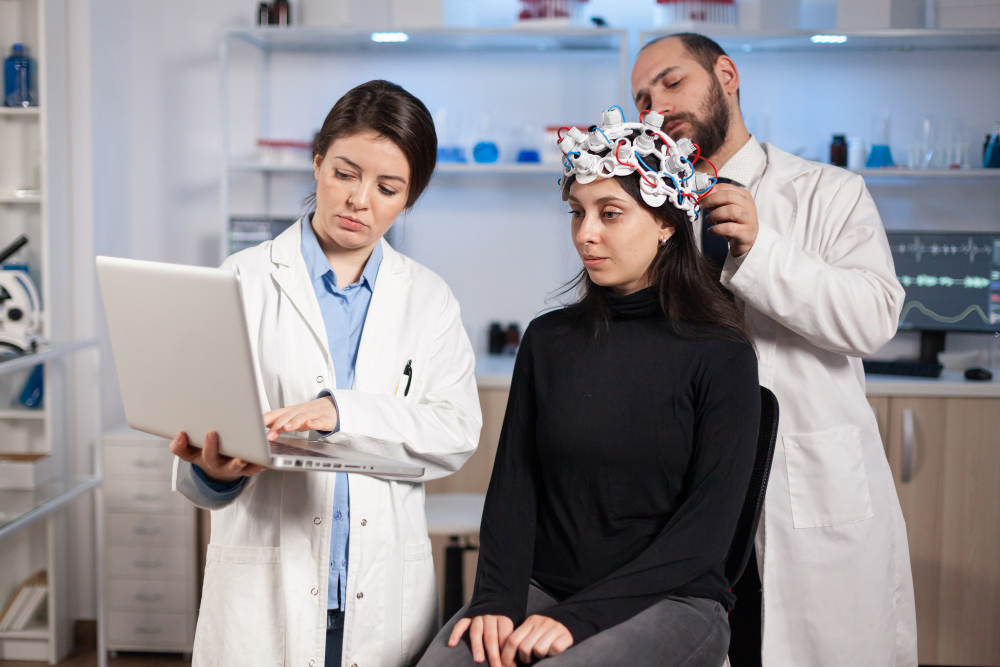How To Get Views On YouTube Shorts? Your Ultimate Guide
Jan 16, 2026

Jan 16, 2026

Jan 16, 2026

Jan 15, 2026

Jan 15, 2026

Jan 15, 2026

Jan 14, 2026

Jan 13, 2026

Jan 13, 2026
Sorry, but nothing matched your search "". Please try again with some different keywords.


Living with ADHD, you didn’t know you had feels… odd like everyone else is cruising on a bike, and you’re pushing a shopping cart with one stuck wheel.
I was talking to one of my psychiatrist friends, who has her own blog where she writes about ADHD and similar topics. She attempts to make it easy for people who cannot afford to book a therapy session.
Talking to her made me realise that the SEO for psychiatrist has to be immaculate, otherwise people won’t get their hands on the right information.
And you know what? If you can get an ADHD diagnosis from someone who knows what they’re doing, you can flip the script.
Suddenly, there’s context for the way your brain zigzags. Treatments actually work, strategies finally stick, and things that used to drain you feel… manageable.
Early diagnosis—whether it’s early or decades late—really does open doors to better relationships, more stability, and perhaps even liking yourself again (imagine that).
To reach out to your audience with important information on ADHD through blogs, you need to have a good sense of keywords and topics.
These are a few examples of topics that you can write on, and/or use as a SEO keyword for psychiatrists.
A psychiatrist for ADHD diagnosis brings specialized medical training that other professionals may not have.
Sure, therapists and psychologists are great at spotting symptoms, but psychiatrists can prescribe medication, sort through messy overlapping stuff (like “Is this ADHD or anxiety… or both?”), and handle complicated histories.
Because ADHD rarely shows up alone—sometimes anxiety tags along, sometimes depression—psychiatrists know how to separate the threads. They understand how these things pile on each other.
They also know which meds won’t clash, which is super helpful because accidentally mixing the wrong ones. Not fun.
If focusing feels like trying to hold onto a soap bar in the shower, ADHD might be involved.
Not the casual “oops, I got distracted,” but an everyday battle to keep your brain from wandering off without permission.
Work, relationships, hobbies—they all take a hit when attention slips constantly.
People with ADHD often say their mind feels like 14 browser tabs are open, half of them playing music.
You jump into projects with enthusiasm and then… poof. Or you stare at someone talking, nodding politely, while their words float right past you even though you care.
Time? What even is it, right? Losing track of it, showing up late, forgetting appointments—those could be ADHD calling cards. And the clutter. Oh man, the clutter. You clean and somehow the mess regenerates overnight like it’s offended you tried to tame it.
Many adults joke they’re “bad at adulting,” but underneath the humor is frustration. Bills don’t get paid on time (not because you can’t—just because the due date vanished from your brain). Papers disappear into mysterious black holes. Even “simple” things like meal planning spiral into chaos.
ADHD isn’t all about attention; it messes with impulses and emotions too. Maybe you interrupt without realizing.
Or, you impulsively buy stuff and regret it later. Maybe tiny things spark huge feelings, and you’re like, “Whoa, that escalated fast.”
Lots of people describe feeling emotions too intensely, like they’re set to a higher volume. Small annoyances explode. Excitement crashes quickly. It’s not a personality flaw—it’s just how ADHD sometimes works, and it can improve with treatment.
Being smart doesn’t cancel out ADHD. You can be wildly intelligent and still struggle to finish what you start. Maybe procrastination is your middle name. Maybe you fully understand the assignment, but can’t get your brain to cooperate long enough to actually do it.
Plenty of people with ADHD mask their symptoms by working twice as hard as everyone else—until burnout hits like a brick. Getting a psychiatrist to evaluate you can finally explain why everything feels harder than it should.
Now that I have mentioned the importance of a good SEO for psychiatrist when they talk about ADHD, I would like to talk about the diagnosis process of ADHD myself.
Your first appointment with a psychiatrist for an ADHD diagnosis usually runs 60–90 minutes, give or take.
They’ll ask about your daily habits, how long your symptoms have been around, how things were for you growing up, and all sorts of stuff you probably haven’t thought about in years.
It helps to give real examples. Instead of “I’m disorganized,” something like “I spent ten minutes looking for my wallet and it was in my hand” paints a clearer picture.
Or “I’ve got a half-built shelf, a half-painted room, and three unfinished hobbies staring at me.”
A full assessment covers medical history, family history, mental health history—basically everything that could affect your brain. They’ll check if the symptoms come from something else entirely: thyroid issues, sleep problems, meds, whatever.
Most psychiatrists use rating scales or questionnaires. Sometimes they ask to talk to someone close to you for an outside perspective (which can feel weird, but helps). The goal is accuracy, not assumptions.
ADHD isn’t the only condition that causes distractibility or emotional ups and downs. Depression can cause foggy thinking.
Anxiety can make concentration impossible. Bipolar disorder can look like impulsivity. Sleep problems can mimic ADHD so well that it’s almost rude.
A good psychiatrist sorts through these possibilities rather than slapping on a label. That’s honestly one of the biggest benefits.
The earlier you address the issue, the faster it will be resolved. You just need to be courageous and take the first step:
Kids who get diagnosed early avoid years of being told they’re “lazy” or “not working to their potential.”
They learn their brain isn’t broken—it just works differently, and there are ways to make that work for them.
Adults often have their own “Ohhh… so that’s why” moment. Suddenly past failures make sense.
They can ask for accommodations, switch routines, or choose jobs that fit better. It’s like someone turned on the lights in a room you didn’t know you were sitting in.
ADHD affects relationships more than people realize—forgetting things, spacing out mid-conversation, and reacting emotionally. Partners or friends might take it personally. Once you understand these things come from ADHD, not a lack of love or interest, things soften a bit.
Treatment helps too. Medication improves listening, reduces interrupting. Therapy helps with communication. And honestly, having language for the problem makes it way easier to talk about.
When you grow up thinking you’re the problem, mental health takes a hit. Anxiety, depression, and low self-esteem often tag along with undiagnosed ADHD. A diagnosis doesn’t magically fix everything, but it reframes the story.
Many people say it’s life-changing. Instead of feeling defective, they understand their struggles had a reason—and solutions.
Without a diagnosis, you can’t access targeted ADHD treatments. Medication helps many people focus, regulate emotions, and think more clearly. Everyone responds differently, so having a psychiatrist manage it makes the process smoother.
Beyond meds, diagnosis opens doors to ADHD-focused therapy, coaching, organizational tools, and even workplace support systems.
These are the areas you can expect to be addressed:
Psychiatrists prescribe stimulants (like Adderall or Ritalin) or non-stimulants (Strattera, Wellbutrin). Stimulants often work fast; non-stimulants take longer but can be better for certain people.
Finding the right med is a bit like trying on shoes—you test a few until one fits well enough to walk in. Keep your psychiatrist in the loop about side effects or weird feelings so they can adjust things.
Medication helps, but most people benefit from therapy too. ADHD-focused cognitive behavioral therapy teaches strategies to manage emotional reactions, organize tasks, and actually keep up with everyday responsibilities.
ADHD coaching, on the other hand, is more practical than emotional—think of it like someone helping you build systems for bills, chores, or big projects.
Your psychiatrist might suggest exercise (it boosts the same chemicals ADHD meds do), better sleep routines, or simplifying your environment so distractions don’t attack from every direction.
These changes won’t replace treatment, but they help everything work better.
If you’re reading this and thinking, “Huh… this sounds familiar,” seeing a psychiatrist for an ADHD diagnosis might be the thing that changes your life. Early diagnosis—or late diagnosis, honestly—saves you from years of unnecessary struggle.
Don’t let fear or embarrassment stop you. ADHD isn’t a failure, it’s a neurological condition that responds to real treatment. And once you understand how your brain actually works, you can build a life that feels less like a constant uphill battle and more like something you’re actually equipped for.
Nabamita Sinha loves to write about lifestyle and pop-culture. In her free time, she loves to watch movies and TV series and experiment with food. Her favorite niche topics are fashion, lifestyle, travel, and gossip content. Her style of writing is creative and quirky.
View all Posts
How To Get Views On YouTube Shorts? Your Ul...
Jan 16, 2026
Ethereum Casino: Is This Online Gaming Platfo...
Jan 16, 2026
What Is A Key Benefit Of Display Campaign...
Jan 15, 2026
Liquidity, Security, And Accessibility: The C...
Jan 15, 2026
Swisscows: Is This Private Search Engine Wort...
Jan 15, 2026

